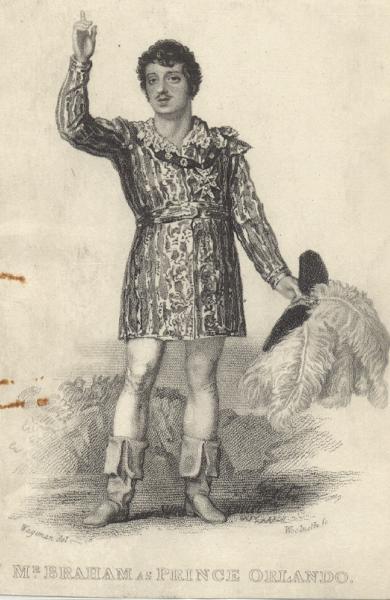John Braham

After his voice break, he resumed his studies with the famous castrato Venanzio Rauzzini in Bath, thanks to the financial
support of the wealthy Goldsmid family. His tenor debut took place in 1794 in Bath. In 1796 at the Drury Lane Theatre, he sang
the title role in the world premiere of Mahmoud by Stephen Storace, with whose sister Nancy, a well-known soprano,
Braham would have a relationship for the next 20 years. Still in 1796, he sang at the Italian Opera in London with success
– unheard of for any non-Italian. His definitive breakthrough came in 1797, with his tenor debut at Covent Garden as
Carlos in The Duenna (by Thomas Linley sen. and Thomas Linley jun., one of the most successful comic operas of the time). From
1798 to 1800, Braham and Nancy Storace were in Italy, where they scored triumphs at La Scala, in Genova, Livorno, Venice and
Trieste; before returning to England, they also sang in Hamburg. John Braham was the first English tenor to be successful on
the European continent.
Back to London, he appeared in turns at Covent Garden, the Lyceum Theatre and the King's Theatre. Although his reputation as a
singer was enormous, he always had to cope with the rampant antisemitism of the society in which he lived; as soon as he
stepped out of the theater, he was rather glanced down at as a Jew than looked up to as a singer. That only changed after he
had fallen out with Nancy Storace, and married a Christian, Frances Elizabeth Bolton, in 1816.
In 1824, a close artistic liaison between John Braham and Carl Maria von Weber began with Braham's interpretation of Max in
the English premiere of Freischütz at the Lyceum Theatre. Weber greatly admired Braham's art, and chose him for the world
premiere of his Oberon on April 12th, 1826 at Covent Garden. Braham sang Hüon, and even though he rejected the aria
From boyhood trained, and demanded not only a substitute aria but also a second showcase aria, Weber patiently obliged,
and remained a fan of his spoiled star tenor.
In the 1830s, Braham's voice began to decline, and he switched to baritone parts like Don Giovanni or Guillaume Tell. Some
unsuccessful investments (he tried to be an impresario, which cost him his fortune) forced him to sing on and on, even when
the voice was gone; his last appearance was in 1852.
He was also a composer; one patriotic song written by him, The death of Nelson, became a long-term favorite in England.
Braham's three sons with Frances Bolton, Charles, Hamilton and Augustus all became
professional singers.
Reference 1: Kutsch & Riemens, reference
2
|